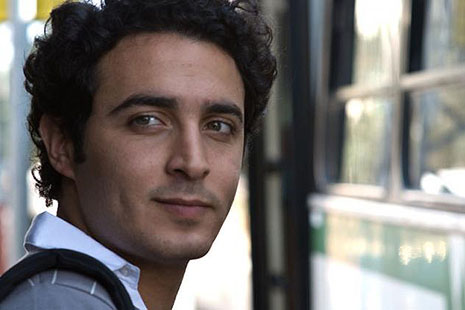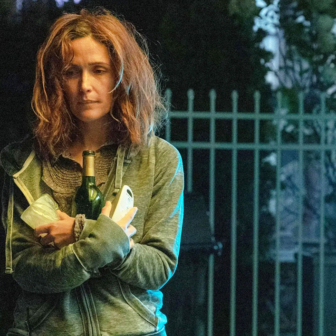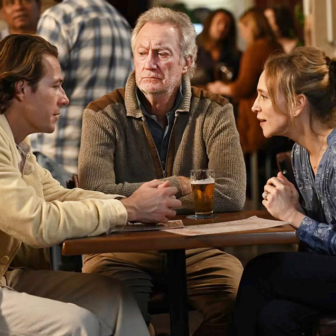LIKE its spreading, leafy campus and the leisured young people who move around it, Liberal Arts is very pretty and seductive; it’s also, for a change, a whole, fully devised comedy about people who read books and think about them. Not as funny as Woody Allen’s brilliantly literate early works, but it’s part of their family; with the anxieties around literary taste in the college dorm here, we’re not too far from the world of Annie Hall. Sharply written and directed by Josh Radnor, who also plays the central character, it’s a multi-stranded exercise which – I can’t help thinking somewhat cynically – is more interesting than it actually meant to be.
The ground of that thought is a degree of narrative imbalance. The plotline follows Radnor’s thirty-five-year-old student counsellor Jesse through his literary enthusiasms and his uncertain love life; he’s his own questing hero, seeming to invite liking and sympathy to the point where you have to refuse them. But there are more engaging stories off to the side, and more interesting performances than Radnor’s own; those come especially from Allison Janney and Richard Jenkins. The latter plays Peter, who once taught Jesse, and who is now retiring; gripped by worry about his farewell event, he phones Jesse in New York, asking him to attend. Reservations about Jesse set in right then, when he tells his former teacher that in order to get there he’ll have to “shift a few things around.” Nonetheless he makes it back to his alma mater, and meets an eager-beaver nineteen-year-old student called Zibby (Elizabeth Olsen), who’s hooked on vampire novels, and wildly determined to pitch into grown-up romance. She wears micro-shorts and floaty Indian shirts.
Selfish as he is, Jesse has enough sense of reality to deflect her aim, and offer further reading instead. Outside academia, he finds one friend who’s eloquently crazy, and another whose life is in disastrous breakdown; reality crashes in. Along the way, he consents to be seduced by Janney’s Professor Fairfield, who once taught him the romantic poets. The script here is great – after sex, she kicks him out abruptly, with instructions to “put some armour round that gooey little heart of yours.” But I jibbed at the sexism in the concept: must a middle-aged, single female scholar necessarily be lonely and embittered? Allison Janney, a marvellous actor, had more fun in The West Wing.
Meanwhile, we don’t find out just what happens to Peter, who has pleaded with the dean of the faculty to let him reverse his retirement, and then been definitively refused. Jenkins’s performance is superb, but Josh Radnor doesn’t know as much about humiliation as (say) Woody – or Ingmar Bergman. This was, potentially, the best part of the story; just what does it mean for a teacher to cease teaching? More, if the teacher has been held in the bonds of the institution for almost forty years, what can it mean to him, or her, when the bonds unravel? Identity is at stake. (Curiously, this Ohio university doesn’t seem to include adjunct and honorary positions, in which the retiree can stay connected – and loaded, if not indeed overloaded, with PhD supervisions.) The film raises the question: what does it mean to live as an intellectual, a reader, thinker, communicator, inside the institution or out?
ARGO arrives in a straight line of descent from All the President’s Men, The Manchurian Candidate, Three Days of the Condor, Syriana and the TV series Homeland. Again, the CIA is jarred by the finer instincts of the honourable individual, one of its own. This version is undeniably fun, a highly enjoyable thriller that has something – but not everything – to do with the recent history it names, the Iran hostage crisis of 1979–82. Ben Affleck directed, from a witty, incisive script by Chris Terrio; Affleck also takes the Robert Redford/George Clooney role (and for this one, Clooney is named among the production credits). Affleck’s Tony Mendez is the operative who must get six imperilled American diplomats out of the country when the Iranian revolution breaks out. Enormous crowds beat on the gates of the US embassy; the six find shelter with the Canadians. Everything hangs in the balance while Mendez devises the scheme whereby the six become a movie-making team at work on a sci-fi thriller – something like the Planet of the Apes. Lester Siegel, the (fictional) Hollywood uber-producer who decides to back the charade, is wonderfully played by Alan Arkin; there’s a real script, the six get new names and biographies and passports. Because this is a white-knuckle thriller, they’re very nearly found out when ultra-skilful Iranian sleuths (played as a rather likeable lot) reassemble shredded photographs from the abandoned embassy. That process, shot fast at very close quarters, typifies the film’s style; it has great speed and rhythm, and never lets up.
Thus history is shortchanged; in Argo’s version of the events in question, the crucial part played in that rescue by the Canadian embassy is somewhat underrated. The remarkable spectacle is in the way the CIA is (again) the entangling monster the hero has to fight, while he remains on its payroll, depends on it for professional identity, and relies on the network of operatives: a maze of interacting paranoias. The mythic power is shaken when you consider recent darker versions: Fair Game, in which Naomi Watts’s Valerie Plame insists (as in reality she did) on sticking to the Agency’s rules at the expense of human fates; and J. Edgar, a study in the grey banality of evil.
AFTER that there was a malfunction in the cinematic antennae, and I went to see Susanne Bier’s Love Is All You Need. Some I know really enjoyed it; one reviewer called it a fine specimen of “bitter-sweet romantic comedy”; another found it “candid” on the after-effects of treatment for breast cancer. It’s frothy, nicely costumed, and very slow-moving. Despite the English title, John Lennon is nowhere around, while “That’s Amore” plays on the soundtrack. The Swedish title translates as The Bald Hairdresser, a title that promised something stronger than we get. On the score of candour, the central character Ida (Trine Dyrholm), supposedly undergoing chemotherapy after surgery, appears improbably young, healthy and unscathed. She and Philip (Pierce Brosnan) play the parents of an intending bride and groom. They’re fine performers, and like many of the cast, the Mediterranean scenery is beautiful; but this pretty, expensive package isn’t really about anything, least of all breast cancer.
OVER four weekends in November and early December, the fourth Palestinian Film Festival came and went in Sydney, Melbourne, Brisbane and Perth. Unlike other annual programs coming from national communities – like, for example, those linked to the Alliance Française or the Goethe Institute – this event has no institutional support, depending entirely on donations and voluntary work; it’s always worth having for the sake of extending understanding as well as cinematic pleasures. I couldn’t be there, but with the help of friends in the organising group, Cultural Media, was able to view some of the program online.
Man Without a Cell Phone (director, Sameh Zoabi), the most popular item on the program, is a markedly good-humoured comedy around a family olive grove inside Israeli territory. A mobile phone tower has been set near the olive trees and put under guard by the authorities, thus infuriating the elderly Palestinian whose land it has been. His son is lively and insouciant; he doesn’t care much about the olive grove, nor about the politics involved, but he does want to pass a test in Hebrew, get into university, and talk to his girlfriend on a mobile. Power is undercut with mockery, and there’s a visible way ahead.
Like that one, Fix Me deserves much wider exposure; it’s something rare and special, an intellectual and political exercise which also works as entertainment. Set in Ramallah, it centres on the film’s director, Raed Andoni – or on a part convincingly played by him – as he tries to deal with a seemingly incurable headache; medication doesn’t help. In long dialogue with a psychotherapist, whose face we never see, it becomes apparent that the headache is really about the Israeli occupation. The patient insists on complicating things; the dialogue is wry, edgy and sometimes hilarious, and the boundary between actuality and drama dissolves in the interests of truth. Last Days in Jerusalem observes a mutually alienated couple – older man, beautiful younger woman – who have resolved to leave Palestine for France. There is little dialogue; they are seen each dealing with personal struggle, visible worry and conflict, as they arrange things, make farewells, go through passages of doubt on the way to departure. What is the gain, when they can’t leave Palestinian identity, or their own relationship, behind? There are things, people and places they hate to leave, and they can’t help each other. This film’s esteemed director Tawfiq Abu Wael – he won the international critics’ prize at Cannes in 2004 – has looked at lots of Antonioni.
For many in its audiences, the most important film of this program was the guerrilla documentary Tears of Gaza, which surveys the toll on the civilian population of the 2008–09 Israeli bombardment of the Gaza Strip (“Operation Cast Lead”). It is directed and produced by the Norwegian team Vibeke Løkkeberg and Terje Kristiansen; thwarted by Israel’s refusal to let journalists and film-makers into the Strip, they managed to smuggle film and instructions in and out. Amateur footage, shot at close quarters, gives images of the bombardment itself: smoke and rubble, kids wounded and dying in an emergency shelter, people stumbling about, trying to recover their lives in the middle of wholesale destruction. If those images could come out of any war film, they are linked here to the more controlled and structured interviews, conducted after the events, with three child survivors; one wants to become a doctor who can heal the wounded. This film has been criticised for its omission of historical context, and accused of being no more than “propaganda for Hamas.” One response could be that other films can be made, offering other kinds of evidence; meanwhile, I’d love to know what’s happened to those kids who spoke up at the time •





